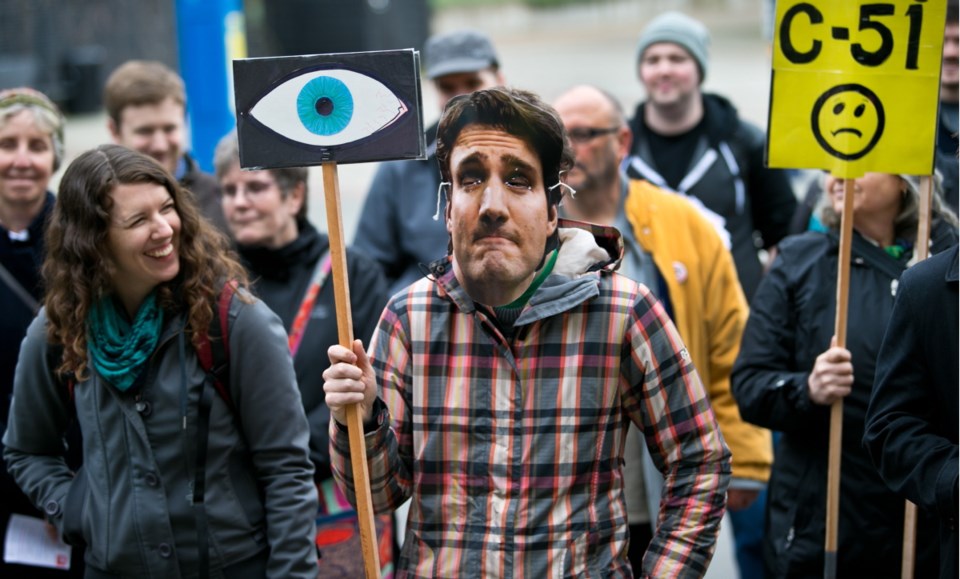Opponents of the proposed $9-billion Site C hydro-electric dam on the Peace River took their fight to the federal government in Victoria on Saturday.
More than 150 protesters took advantage of having a captive audience at the Victoria Conference Centre — where the Liberal Party of Canada in B.C. was holding a policy conference — to crowd the sidewalk across the street in the hopes of persuading Ottawa to step in and stop the project.
“The convention is here, Liberal cabinet ministers are here, and it’s not every day we see them in our town,” said Ana Simeon, Peace Valley campaigner with the Sierra Club B.C. “It’s a long project and there’s plenty of time to stop it.”
According to the B.C. government, the project will provide the province with clean energy for more than 100 years. The demand for power is expected to increase by 40 per cent over the next 20 years, as B.C.’s population and economy grow.
“The province continues to consult with First Nations on all authorizations that will be required for the project,” the province said in a statement. “Site C will provide approximately 10,000 direct jobs during construction. The project will generate enough electricity to power about 450,000 homes per year, an eight per cent increase in supply to B.C. Hydro’s system, in 2024.”
The Sierra Club calls the project the “biggest violation of treaty and aboriginal rights in this country right now.” The West Moberly and Prophet River First Nations have said no to the Site C dam and are challenging the project in court.
The protesters — which included environmental, activist and First Nations groups — feel their concerns are being ignored by the province.
“Premier [Christy] Clark is not listening, for whatever reason, and yet there are so many groups and sectors against this,” said Simeon, who said protesters want the federal government to pause activity in the Peace River area while court challenges to the project go through the system.
Veteran environmental activist Vicky Husband called Site C a “stupid project that will cost us the Earth, the river and people’s rights and agricultural land.”
“This is a vanity project that no one should be supporting,” she added. “This is Christy Clark’s project, it’s not clean power, and [it] supports the LNG and fracking industry.”
Steve Gray of the B.C. and Yukon chapter of Kairos, a group of churches and religious organizations working on ecological issues, said they’ve given up expecting the province to listen.
“It’s sort of a lost cause with the provincial Liberals,” he said. “Stephen Harper put through environment certificates to allow [Site C] to proceed, so what we’re [saying is Prime Minister] Justin Trudeau can remove the certificates and bring things to a halt.”
Gray said with B.C. Hydro now clearing forest in the area, what they want is a pause in proceedings, to have the B.C. Utilities Commission review it and for someone to explain why it’s needed.
“It’s not too far gone, it will be four to six years before we are at the point of no return,” he said.
Many of the delegates at the Liberal convention walked through the protest to a lunch meeting at Crystal Garden. Some walked by without a word, some debated with clusters of protesters and others voiced their support for the action the protesters were taking.
The Liberal delegates — who attended sessions on fundraising, policy and campaign debriefing — also got an earful Saturday from protesters urging the government to repeal Bill C-51, an anti-terrorism law passed under the Harper government.
The law has been characterized by opponents as excessive and alarming as it gives the Canadian Security Intelligence Service the power to disrupt terror plots, made it easier to limit movements of a suspect, expanded no-fly list powers, cracked down on terrorist propaganda and removed barriers to sharing security-related information.
“This law has less to do with protecting Canadians, and more to do with restricting our rights and freedoms,” Laurel Collins, a University of Victoria instructor in social justice studies, said in a statement.
“The Liberals have promised to amend parts of Bill C-51, but it is unrealistic to expect to build effective legislation from something so fundamentally flawed.”



